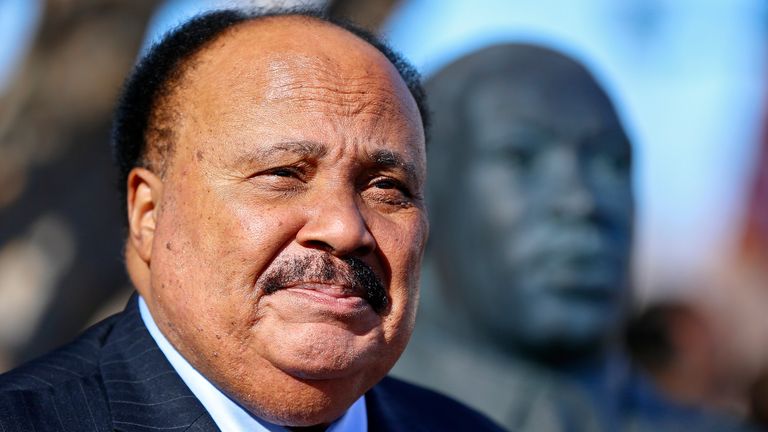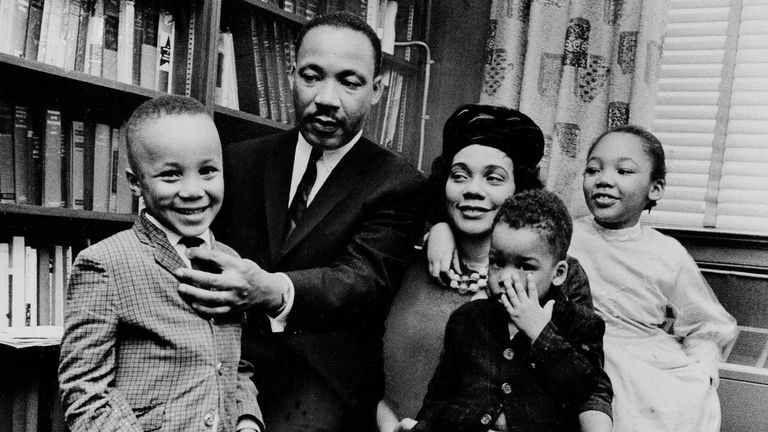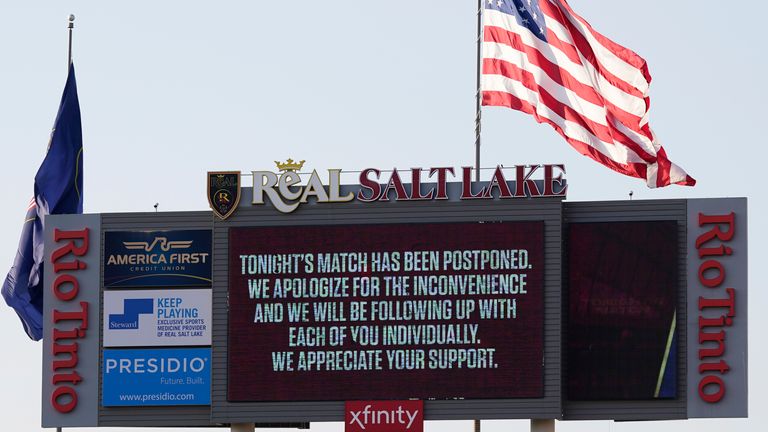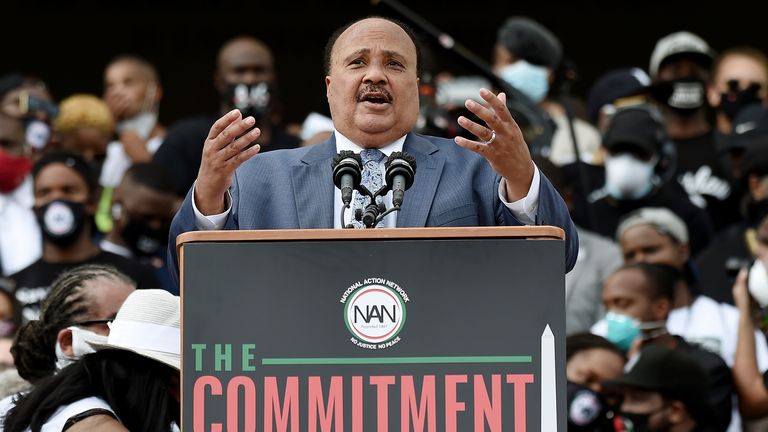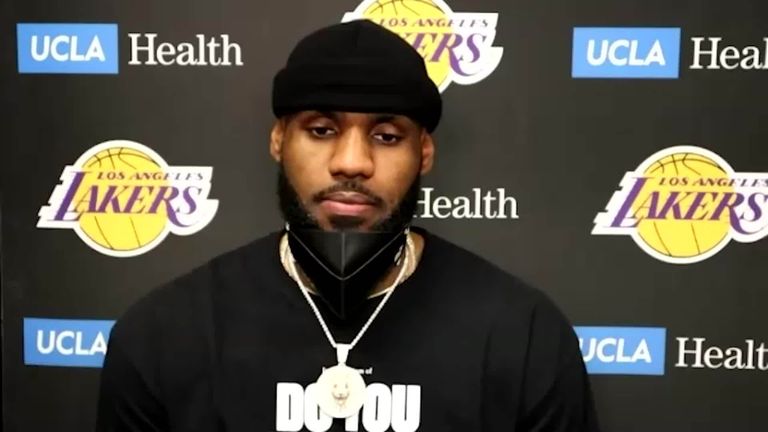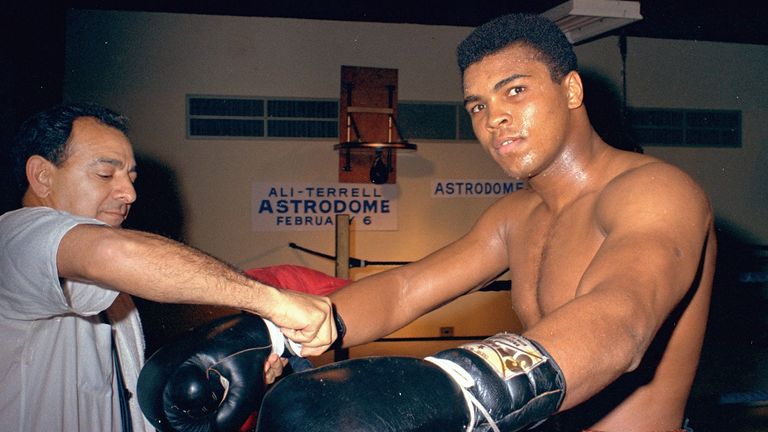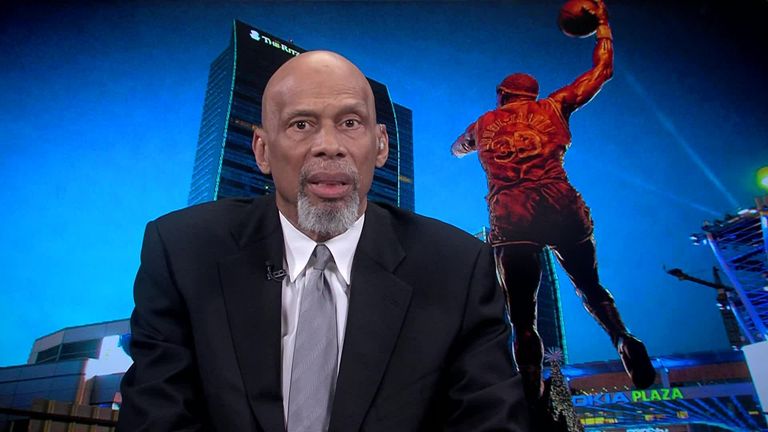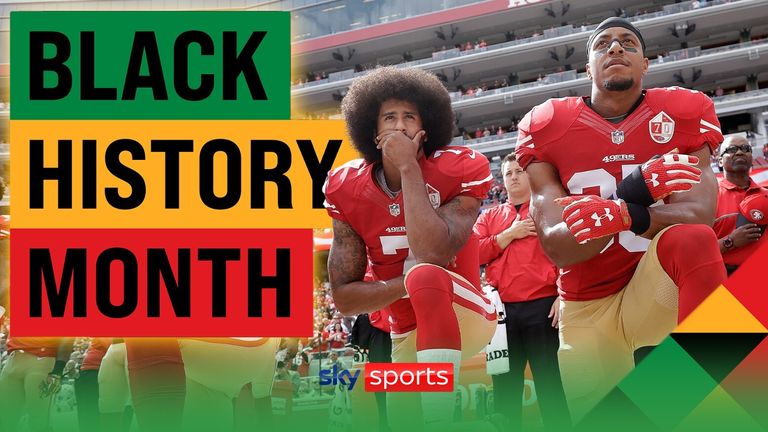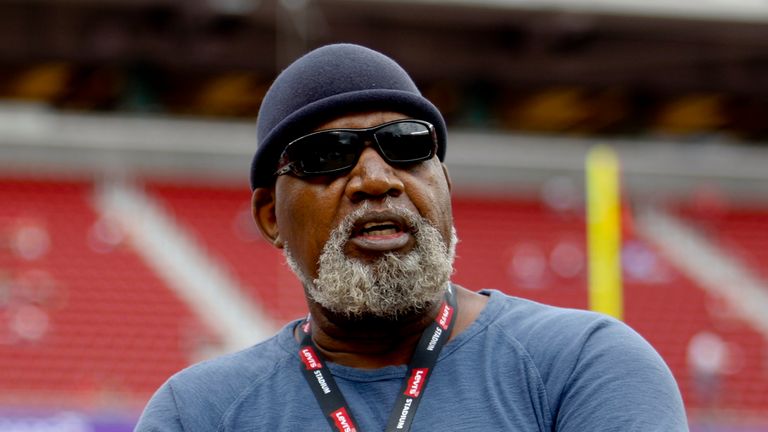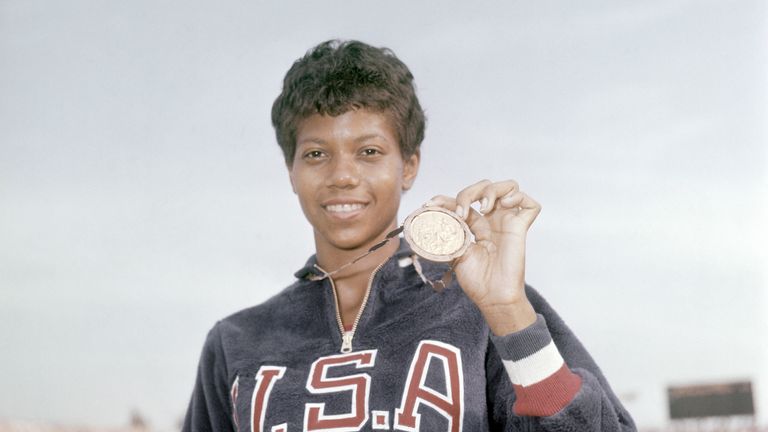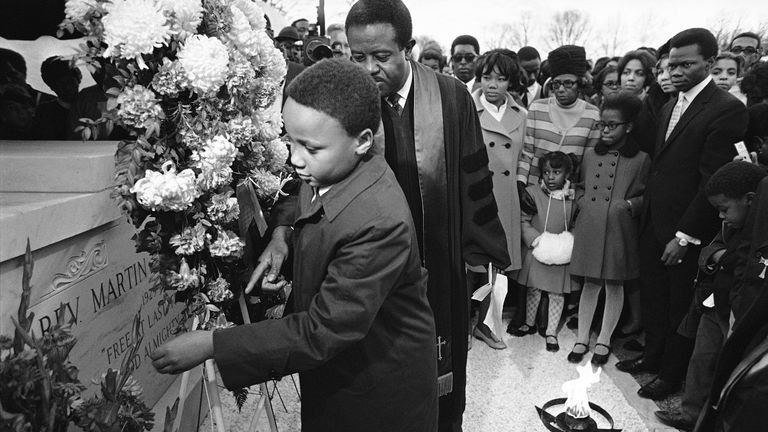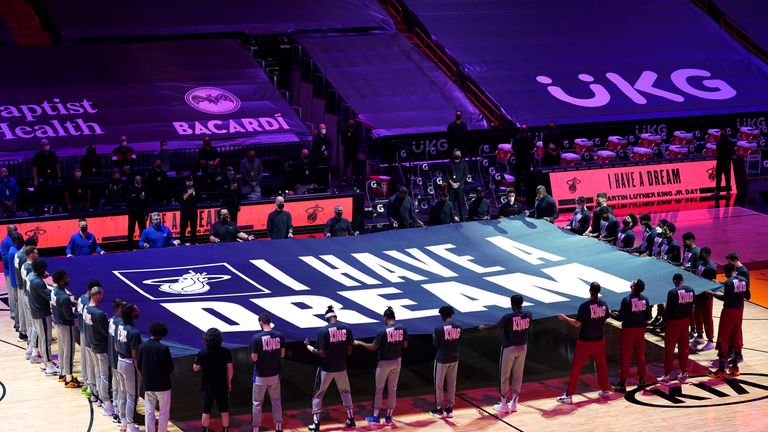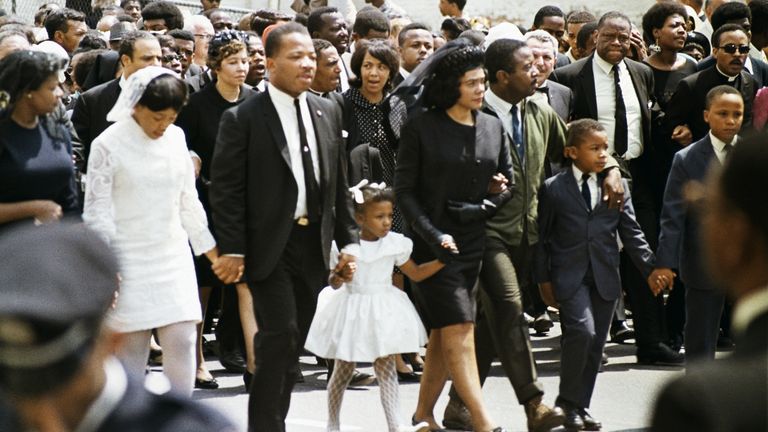Martin Luther King III: Players boycotting sports will guarantee action on racism overnight
Martin Luther King III says sports stars should consider refusing to play to fight racial injustice; "We are seeing athletes use one level but if they use the ultimate level, we would probably see some changes overnight"; son of Dr Martin Luther King Jr speaks to Mike Wedderburn
Tuesday 25 May 2021 11:57, UK
Martin Luther King III believes players should consider boycotts because the power of sport would guarantee "overnight" action on racial and social injustice.
Athlete activism has been in the spotlight in the year since George Floyd's murder as some players in the United States increasingly use their platform to speak out, protest, and even refuse to play.
Civil rights activist Martin Luther King III - the eldest son of Dr Martin Luther King Jr - believes players and teams can help fulfil his father's vision.
"If athletes decide we're not going to play, you will have a major backlash in terms of what these [team] owners will change overnight," he told Sky Sports News presenter Mike Wedderburn in an exclusive interview.
"They'll flip overnight because sport is such a huge industry in our nation and world. And so players have a lot more influence than maybe they even have considered."
In August the Milwaukee Bucks decided to boycott Game 5 of their NBA playoff series against the Orlando Magic in protest over Black man Jacob Blake being shot in the back by police in Wisconsin.
A team statement also referenced a lack of action over ongoing racial injustice, adding: "Our focus today cannot be on basketball."
No professional sports team in America had ever refused to play a game in such circumstances. Two other playoff games scheduled for that night were also called off, and three more the following day.
Women's NBA, Major League Baseball, National Hockey League and Major League Soccer games were all postponed following player-led actions.
"Wherever injustice is, people have to stand up," 63-year-old King said.
"Dad used to say injustice anywhere is a threat to justice everywhere. We are seeing these unjust types of behaviour happening over and over again, but we are also seeing athletes use one level.
"But if they use the ultimate level, we would probably see some changes overnight."
'Show me a 10-point plan or we won't play....'
King admits the move to boycott would be a tough choice for many athletes and describes it as a "sacrifice for the community".
"If NFL ballplayers said, 'OK, until you have a five or 10-point plan that shows me how are we going to address these issues that impact my community - we're not going to play now'."
"They'll try to salvage the league. But it's a very bold, very profound, it's a very extreme point of view. We may be at that point where athletes have to use their platforms to say, 'OK you know what, I'm going to make a sacrifice for my community'."
Many of the NBA-led changes came after athletes protested against racial injustice following the police shooting of Jacob Blake.
Part of the agreement that allowed the NBA season to resume included measures related to this year's US election.
The NBA and the Players' Association agreed that in cities where teams owned and controlled their venues they could use their facilities to help people vote in person. In places like Atlanta, this helped to reduce queues and made it easier for people to vote.
The governing body and players also agreed to establish a "social justice coalition" to focus on "increasing access to voting, promoting civic engagement, and advocating for meaningful police and criminal justice reform".
The NBA also committed to advertising spots in each playoff game to promote greater civic engagement and raise awareness around voter access and opportunity.
'LeBron James helped to change US election'
The sport's biggest star, four-time NBA champion LeBron James, spearheaded a multi-million dollar voting rights organisation called More Than A Vote to encourage African Americans to cast their ballots for this year's US Presidential election.
It tried to energise and educate Black voters, fight voter suppression and provide advice on misinformation online. The campaign also helped to recruit tens of thousands of poll workers because of a shortage of volunteers.
Those involved with More Than A Vote included fellow NBA All-Star Trae Young, WNBA star Skylar Diggins-Smith, Kansas City Chief's quarterback Patrick Mahomes, and 2017 US Open tennis champion Sloane Stephens. In the build-up to the election, they also worked alongside Michelle Obama's similar When We All Vote initiative.
"We had more young people voting than ever before and we changed Presidents," Martin Luther King III said.
"And I think had it not been for LeBron James and many others - he's not the only one. But he's significantly one of the athletes who's making a difference and using his voice.
"Historically we've had, whether it was Muhammad Ali or Jim Brown or Kareem Abdul Jabbar ... the list goes on and on of athletes. Today, I think LeBron is one of those who represents that same kind of energy."
Abdul Jabbar was one athlete who did use his boycott by refusing to go to the 1968 Olympics in Mexico City.
The NBA's all-time leading scorer told Sky News reporter Sadiya Chowdhury: "It was at a time where I didn't feel very patriotic. Dr Martin Luther King had just been assassinated in April 1968.
"It was hard for me to feel good about representing my country when things like that were happening so I couldn't go."
Kaepernick's treatment 'wrong on all levels'
When Colin Kaepernick decided in August 2016 to sit down during the national anthem at an NFL preseason game between the San Francisco 49ers and the Green Bay Packers, it divided the sport and people across the United States.
The 49ers quarterback had actually sat for several games but this time it was both widely reported and criticised as the quarterback was in uniform and was about to take to the field for the first time in 10 months.
After a meeting with NFL rookie and Green Beret Nate Boyer, Kaepernick decided to take a knee rather than sit during the national anthem to protest racial inequality and police brutality.
"Colin Kaepernick is standing up against all of this injustice that exists in America. You should be allowed," King said from his home in Georgia.
"We're the nation that claims that we have freedom and justice and you can you have the right to protest.
"And that's what he was doing. And yet you lose your job. That's just not right. That is wrong on all levels"
African American athlete activism has a long tradition stretching back over a hundred years. Apart from Kaepernick, other high-profile examples fighting racial injustice include 200m medallists Tommie Smith and John Carlos raising their fists on the podium at the 1968 Olympics.
Dr Harry Edwards, a world-renowned expert on the sociology of sport and founder of the Olympic Project for Human Rights (OPHR), played a key role in leading action against racial injustice in the late 1960s.
He met Dr Martin Luther King Jr and said the civil rights leader understood the power of sport and how a boycott of the 1968 Olympics could bring change.
Dr Edwards, who has worked at the 49ers as a staff consultant and player personnel development counsellor, advised Kaepernick and was also the inspiration behind the protests of Carlos, Smith and other US athletes at the 1968 Games in Mexico City.
In recent years he has acted as counsel to NBA and WNBA stars who want to use their sporting platform to take a stand. His message to athletes today is the same as 1968.
"Have fun, love what you're doing. Become a champ, become the greatest at what you do on the face of this earth. That stage will be the platform from which you make an even more impactful statement than you do through your athletics.
"It's not accidental that all of these athletes: Jesse Owens, Joe Lewis, Jack Johnson, Paul Robeson, Smith, Carlos, Jim Brown, Bill Russell, Arthur Ashe, Curt Flood, Colin Kaepernick, LeBron James, Maya Moore, Wilma Rudolph. All of these were great athletes first!
"If you are a great athlete, the platform that you're seeking on these broader issues becomes bigger, becomes higher, and it becomes a whole lot more difficult to simply write you off as a disgruntled loser who is angry and upset because you're not everything you want to be in an athletic world."
"So I always told the athletes the same thing. Be great. Look to serve, first of all be a great athlete because that is the stage, that is the platform from which you will address these other issues that are even more important than your own individual outcomes in sports to you", said Edwards, the author of the 1969 book The Revolt of the Black Athlete.
'The world understands racism after George Floyd's murder'
King, who was 10 when his father was assassinated in 1968, believes we are starting to see substantial progress in many countries around the world.
He said: "When George Floyd died that whole month and a half or so afterwards, maybe longer than that, there were protests on every continent.
"Certainly in Europe, certainly in Australia, certainly on the African continent, in South America, in Canada. The only place there probably were no protests may have been Antarctica!
"Most of these countries or many of these countries are vast majority-white countries. You had whites leading these demonstrations and that incident, that tragedy, the world knows George Floyd and understands.
"It's almost like racism now is understood.
"I think that we're seeing a level of consciousness in CEOs that at least is on the transition of changing. The change has not come yet [or] totally manifested itself."
'Dad wanted to eradicate racism ... I believe we will'
Sports stars and teams have been willing to take a much more active role in protests in the last year. The idea of not willing to play to improve society is now an option for many players and teams around the world.
For Martin Luther King III, sport can play a pivotal role in continuing his father's legacy.
He said: "Dad wanted to eradicate what he called the triple evils of poverty, racism and violence, and he defined them. And unfortunately, you know, part of my dream is for us to overcome these evils because we can. The fact of the matter is, we have not done it.
Does King believe we can achieve that? "I think we will," he replied straight away.
"I'm going to continue to work for these things and build a coalition with others who are interested in working. And the reality is, yes we will get there.
"Dad told us back in 1968 that I've been to the mountaintop and I've seen the promised land. And he also went on to say that we will get there as a people. I may not be with you then, but we as a people will get to the promised land. I believe that, I have to believe that each and every day.
"And I've seen individual progress, phenomenal individual progress. I just have not seen that translate transfer down to the masses.
"We can make it happen."
